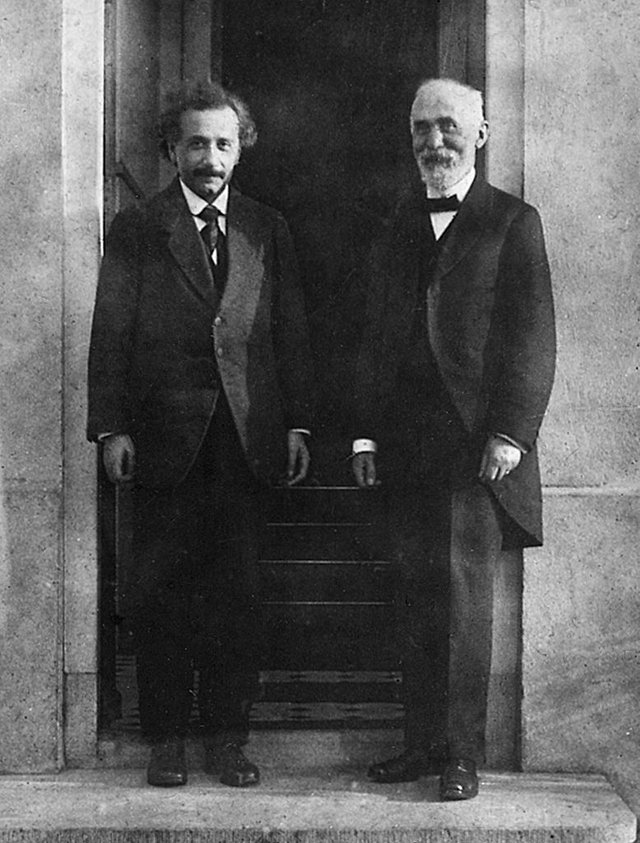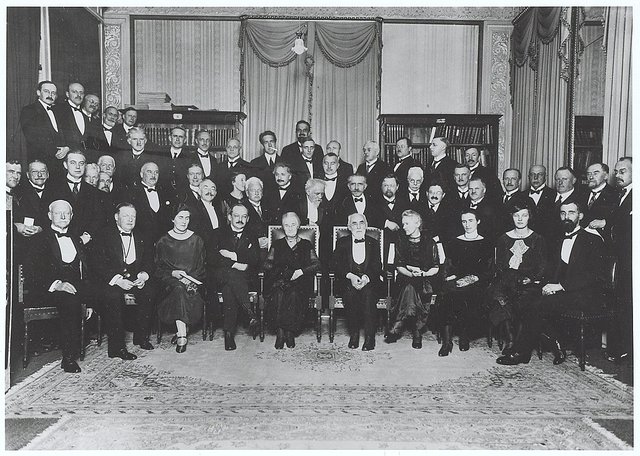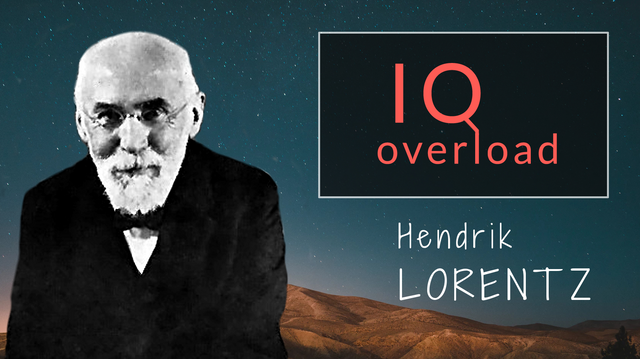#12 IQ overload: Hendrik Lorentz
Every community needs a person who can settle disputes; a person who is respected by each member of this community - a leading spirit. Could the Chairman of Solvay Conference be a one for the physics community?
The Chairman of Solvay Conferences
// For those who are here for the first time
Hello! I'm @jakipatryk and I run a series called IQ overload. As you can see, it is about great scientists. To be more precise - great scientists who participated in the 5th Solvay Conference. I hope you will have a good time reading each episode, especially this - about Hendrik Lorentz.
Early life
Born on July 18, 1853, in one of the larger cities of the Netherlands Hendrik Antoon Lorentz experienced a hard time already at the age of 4, when his mother Geertruida van Ginkel died. However, this tragedy didn't stop him from shinning at school. He was found really distinguished at the public high school he attended - Hogere Burger School.
You might remember that Albert Einstein wasn't good at humanities. An interesting fact is that young Lorentz was the best in literally everything, even classical languages. In 1870 he passed exams (including classical languages) to attend Leiden University. Lorentz studied physics and mathematics there.
One year later he got his bachelor's degree and he started preparing for doctoral thesis. At the same time, Lorentz returned to his hometown, Arnhem, where he was working as a night-school teacher. Combining both responsibilities he managed to earn his doctor's degree at the age of 22.
Still young Lorentz three years later, in 1878, became the head of Chair of Theoretical Physics at Leyden.

Albert Einstein and Hendrik Lorentz (1921)
[source: Wikimedia]
From Zeeman effect to the Nobel Prize
Lorentz was mostly interested in theoretical physics, especially the field of electromagnetism and relativity. In 1896 his former student Pieter Zeeman motivated by the assumptions on polarized light in a magnetic field made by Lorentz, discovered phenomenon later called Zeeman effect.
Zeeman observed that if the light is placed in the magnetic field, individual absorption lines or emission lines in the electromagnetic spectrum don't behave like outside of this field. It turns out that in this case they are not individual anymore - they get split into multiple lines.
Hendrik Lorentz informed about this quickly proposed a theoretical interpretation. Both of them received a Nobel Prize in Physics in 1902 "in recognition of the extraordinary service they rendered by their researches into the influence of magnetism upon radiation phenomena".
Road to special relativity was through ether
Both Einstein's special and general theory of relativity is widely known nowadays. Hendrik Lorentz was the one without whom there could be no special theory of relativity or at least it would be delayed, even though he used to think that the whole universe is filled with motionless ether.
The most important contribution were probably Lorentz transformations, which were a bunch of equations that enabled to calculate the space and time coordinates of two systems in a motion with constant velocity to each other.
Solvay Conferences on Physics
The first Solvay Conference in 1911 was a big event. The first meeting between Einstein and Poincaré actually happened there. Great minds were discussing on the subject "Radiation and the Quanta".
It turns out that the chairman of this conference was Hendrik Lorentz. An interesting fact is that he held this position also in the next four Solvay Conferences on Physics (including 5th in 1927).
It may well be said that Lorentz was regarded by all theoretical physicists as the world's leading spirit, who completed what was left unfinished by his predecessors and prepared the ground for the fruitful reception of the new ideas based on the quantum theory.
[source: nobelprize.org]
Later life
From the year 1918 till 1926 Lorentz was working on a hydraulic engineering problem - the government of his homeland asked him to calculate the possible effects of the flood control dam on water levels in the Wadden Sea. It doesn't seem to be a work for a great theoretical physicist, but it turned out that he was the only one who could solve this problem in a newly created committee for this case.
In his later life, Hendrik Lorentz led some prestige organizations related to science, for example, International Committee of Intellectual Cooperation of the League of Nations, where he became a President in 1925.
Hendrik Lorentz died at the age of 74, on 4 February 1928.

The honoring of Professor Lorentz, Dutch Society of Sciences (1925)
[source: Wikimedia]
Summary
Hendrik Lorentz was a great scientist who shared Nobel Prize in Physics with his former student Pieter Zeeman in 1902. He was also the Chairman of the first five Solvay Conferences on Physics. He could be called a leading spirit of a community which is responsible for creating fundamentals of quantum mechanics and theory of relativity.
References
- more about Hendrik Lorentz:
- more about Zeeman effect:
- Investigating the Zeeman Effect: A Deeper Look by Lauren Woolsey
0. IQ overload: the story of one photo
1. IQ overload: Maria Skłodowska-Curie
2. IQ overload: Niels Bohr
3. IQ overload: Albert Einstein
4. IQ overload: Werner Heisenberg
5. IQ overload: Erwin Schrödinger
6. IQ overload: Max Planck
7. IQ overload: Louis de Broglie
8. IQ overload: Arthur Compton
9. IQ overload: Max Born
10. IQ overload: Paul Dirac
11. IQ overload: Wolfgang Pauli
12. IQ overload: Hendrik Lorentz
Bonus parts:
#2017 IQ overload: Barry Barish, Rainer Weiss and Kip Thorne

gif made by @rocking-dave
Do you like Science, Technology, Engineering or Mathematics? Check out #steemSTEM and @steemSTEM!

This lovely...
"Every community needs a person who can settle disputes; a person who is respected by each member of this community - a leading spirit" 😚😚😚
What a brilliant series of posts! Great idea!
Indeed, it's great information you've summed up here. Nice article.
I loved your idea of this IQ series. Cheers!
Thanks